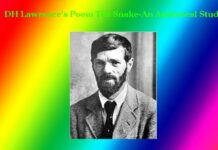Nissim Ezekiel | The Professor | Analytical Study
Nissim Ezekiel’s Poem ‘The Professor’-An Analytical Study
Introduction:
“The Professor” by Nissim Ezekiel is a poignant and thought-provoking poem that explores the transformation of a once vibrant and humorous professor into a withdrawn and troubled individual. The poem delves into the professor’s current state of isolation and despair, questioning the reasons behind his profound change.
Stanza 1:
The poem begins by raising the question of why the professor continues to stay in his current circumstances. It is revealed that his railway pass has been withdrawn, indicating a loss of privileges. The librarian has received a book that the professor kept overdue for an astonishing twenty years, suggesting a lack of responsibility or detachment from worldly concerns. The professor’s situation is characterized by deprivation, as he possesses neither money, books, nor furniture.
Stanza 2:
The poem further underscores the professor’s state of desolation by highlighting the loss of his jovial nature. Previously, he was described as a “fellow of infinite jest,” meaning he was a witty and lighthearted individual. However, he has now become quiet and serious, exhibiting signs of deep introspection and emotional withdrawal. He seems disinterested in the world around him, only leaving his room to attend classes.
Stanza 3:
The professor’s detachment from his surroundings is emphasized as he does not respond when others call him, he doesn’t eat, and he appears to have lost interest in reading, which was likely a significant part of his life before. Instead, he spends his days sitting and staring at the wall, indicating a state of emotional numbness or contemplation.
Stanza 4:
The poem speculates about the underlying cause of the professor’s current state. It suggests that there is something troubling him, possibly related to the concept of “infinity,” which could represent an overwhelming and unanswerable question. The alternative explanations considered include “lunacy” (insanity) or the “lamentable reality of a restricted world,” implying that the professor’s condition might be a result of feeling trapped or confined in his current circumstances.
Conclusion:
“The Professor” by Nissim Ezekiel presents a powerful portrayal of a once vibrant and humorous academic reduced to a state of isolation and despair. The poem invites readers to reflect on the complexities of human emotions and the potential impact of life’s challenges on an individual’s mental and emotional well-being. By exploring the professor’s transformation and the possible reasons behind it, the poem raises broader questions about the human experience, the search for meaning, and the potential consequences of our actions and choices. 0 0 0
Nissim Ezekiel | The Professor | Analytical Study
N. B. The article ‘Nissim Ezekiel | The Professor | Analytical Study’ originally belongs to the book ‘Analytical Studies of Selected Indian English Poems‘ by Menonim Menonimus.
Books of Literary Criticism by M. Menonimus:
- World Short Story Criticism
- World Poetry Criticism
- World Drama Criticism
- World Novel Criticism
- World Essay Criticism
- Indian English Poetry Criticism
- Indian English Poets and Poetry Chief Features
- Emily Dickinson’s Poetry-A Thematic Study
- Walt Whitman’s Poetry-A Thematic Study
- Critical Essays on English Poetry
- Tawfiq al-Hakim’s Novel: Return of the Spirit-An Analytical Study
- Tawfiq al-Hakim’s Novel: ‘Yawmiyyat Naib Fil Arayaf’-An Analytical Study
- Analytical Studies of Some Arabic Short Stories
- A Brief History of Arabic Literature: Pre-Islamic Period (500 AD-622 AD)
- A Brief History of Arabic Literature: Early Islamic Period (622 AD-661 AD)
- Reviews on William Shakespeare’s Works
- Reviews of Charles Dickens’ Works
- Reviews of John Milton’s Literary Works
- Reviews of Some Iconic Travelogues
- Shakespeare’s Sonnets-Critical Studies
- Analytical Studies of Selected Poems of Sarojini Naidu
- Analytical Studies of Selected Poems of Rabindranath Tagore
- Analytical Studies of Selected Indian English Poems …
Additional Searches :











